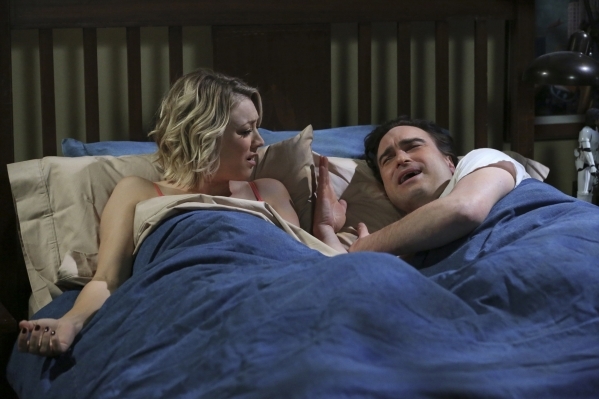Theatrical romances commonplace but can derail a show
Just about everybody, bosses and employees alike, can understand the potential pitfalls of the workplace romance.
But what if your workplace is a stage and evoking deep emotions is pretty much the job description? Someplace where a busted workplace romance won't be just fodder for office gossip, but a potentially show-killing event and a disappointing night out for paying audience members?
Last week, people who wonder about such things wondered whether Kaley Cuoco and Johnny Galecki, both stars of the TV sitcom "The Big Bang Theory," were dating, after photos of the actors going out were posted on social media sites. (Cuoco, by the way, indicates that they're not.)
We, meanwhile, wondered how theatrical romances — romances between actors performing in the same play, movie or TV show — might differ from the normal, workaday office romances the rest of us see every day at our own workplaces.
For starters, theater people have their own name for romances that blossom among a production's cast members: showmances. And, area theater directors say, they're bound to happen, just as in any other place where adults make their living.
Torrey Russell, founder of Broadway in the Hood, says the theater is "an environment where you have such a tight rehearsal schedule and there are so many different emotions going around, and you get to see people in a different light. You get to see their vulnerabilities that, if you were dating outside the theater, you probably wouldn't see until you're really intimate."
For instance, Russell says, "for a woman to see a man cry onstage, to see him open up and let out his emotions and feelings out, that can be really attractive to a woman."
The vulnerability and emotions theater requires, coupled with the intense practical demands of mounting a play, can create an insular world in which romance can bloom.
"You see showmances all the time, because you're in a very intimate position where you have to become different people," adds Troy Heard, producing director of the Onyx Theatre. "And if you're strangers playing a couple, you're thrust together. And, not in all circumstances, but it can bleed over (into a performance), and when it does and it's going in the wrong direction, sometimes it can be a mess and you have to pull out a lot of damage control."
Walter Niejadlik, president of Las Vegas Little Theatre, says showmances happen "quite a bit, especially when you've got actors who are supposed to be involved onstage. It can happen just because they're working in these (emotional) areas, and it's great when everything's going great. It can add this extra level of depth to what happens onstage.
"But when (a showmance) starts falling apart during the run of of the show or even, God forbid, even in rehearsal, it can be challenging. You get lucky sometimes, and people can be professional about it and carry on. But sometimes, you end up having to be a referee, which is never fun."
Worse, Heard says, "when it goes bad it infects the entire company. So you do have to do damage control and pray they're mature enough to separate real life from the art."
Russell recalls a play featuring a male lead and a female lead who was "a beautiful girl, very attractive, very pretty."
The lead male understudy thought so, too, and fell for her, Russell says, creating tension between the two actors and an uncomfortable vibe for the entire cast.
Long story short: From a director's point of view, the potential showmance "could become very detrimental to the performances," Russell says. "I did end up firing the gentleman on the spot, and that leads to a very gray area because, at the end of the day, it really does boil down to who the show needs more."
Showmances between actors and directors present additional issues. Niejadlik remembers a director who began a relationship with his leading lady and became reluctant to give notes on her performance as any other director would.
Eventually, he says, an assistant director was charged with working with the actress on her scenes.
Heard says he's not yet experienced "a horrible situation" stemming from a showmance, adding that, so far, "it's just never been one of those things where it's affected the production."
Niejadlik says he's not encountered a situation where someone had to be let go because of a nasty failed showmance, although "I've seen it in the professional theater world."
"I've never been to the point where I had to stop a rehearsal," he adds, "but I have on occasion pulled actors aside to say, 'OK, what you do in your personal life is your business, but while you're here in rehearsals, you're going to be civil or you're both going to be let go."
"I'm very strict on not bringing your personal life to work," Russell says. "One of the rules is that if you're in love with someone (in the cast), I'd better not know you're in love, because it's all about business, and when it comes to business you have to be business-minded."
And if an actor's own professionalism isn't enough, fellow cast members can be useful in not letting a showmance-gone-bad imperil a production.
"Even at the level we're working at, with people not getting paid, they still invest a lot of their energy and time into rehearsing a play, and no one wants it to be a disaster," Niejadlik says.
"For the most part, I think people are able to set aside differences, especially if you're in a show that has more than a couple of people in it and it tends to be more of an ensemble feel, and you're not just accountable to yourself, but to other people onstage with you. And, a lot of times, they just won't let you."
— Read more from John Przybys at reviewjournal.com. Contact him at jprzybys@reviewjournal.com and follow @JJPrzybys on Twitter.




























